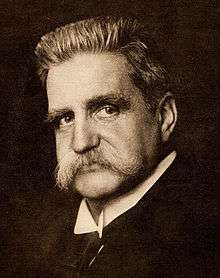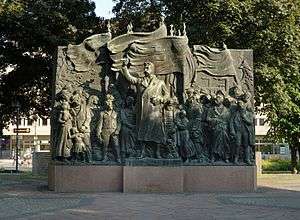Hjalmar Branting
Karl Hjalmar Branting (Swedish pronunciation: [ˈjǎlmar ˈbrânːtɪŋ] (![]()
Hjalmar Branting | |
|---|---|
 | |
| Prime Minister of Sweden | |
| In office 10 March 1920 – 27 October 1920 | |
| Monarch | Gustaf V |
| Preceded by | Nils Edén |
| Succeeded by | Louis De Geer |
| In office 13 October 1921 – 19 April 1923 | |
| Monarch | Gustaf V |
| Preceded by | Oscar von Sydow |
| Succeeded by | Ernst Trygger |
| In office 18 October 1924 – 24 January 1925 | |
| Monarch | Gustaf V |
| Preceded by | Ernst Trygger |
| Succeeded by | Rickard Sandler |
| Personal details | |
| Born | 23 November 1860 Stockholm |
| Died | 24 February 1925 (aged 64) Stockholm |
| Political party | Social Democrats |
| Spouse(s) | Anna Branting (née Jäderin) |
| Children | Georg Branting Sonja Branting-Westerståhl |
| Signature |  |
Biography
Born to the professor Lars Gabriel Branting and the noblewoman and pianist Emma af Georgii, Branting was educated in Stockholm and at Uppsala University. He developed a scientific background in mathematical astronomy and was an assistant at the Stockholm Observatory, but gave up his devotion to scientific work to become a journalist in 1884 and began editing the newspapers Tiden and Social-Demokraten. His decision to publish an article by the more radical socialist Axel Danielsson, a piece denounced by opponents as insulting to religious sensitivities, resulted in political convictions for blasphemy and imprisonment for both men.[1] Branting was imprisoned for three months in 1888.[2]
Together with August Palm, Branting was one of the main organizers of the Swedish Social Democratic Party in 1889. He was its first Member of Parliament from 1896 and for six years the only one.
In the early years of the 20th century, Branting led the Social Democrats in opposing a war to keep Norway united with Sweden. When the crisis came in 1905, he coined the slogan "Hands off Norway, King!" The Social Democrats organized resistance to a call-up of reserves and a general strike against a war and are credited with a substantial share in preventing one.
Branting accepted Eduard Bernstein's revision of Marxism and became a reformist socialist, advocating a peaceful transition from capitalism towards socialism. He believed that if workers were given the vote, this could be achieved by parliamentary ways. Branting supported the February Revolution in Russia in 1917. He was pro-Menshevik and defended the government of Alexander Kerensky, whom he even personally visited in Petrograd.
When the October Revolution broke out the same year, Branting condemned the Bolshevik seizure of power. 1917 saw a split in the Swedish Social Democratic Party on this question, and the youth league and the revolutionary sections of the party broke away and formed the Social Democratic Left Party of Sweden, headed by Zeth Höglund. This group soon became the Swedish Communist Party. Höglund later returned to the Social Democratic Party and wrote a two-volume biography about Branting.
As Prime Minister, Branting brought Sweden into the League of Nations and was personally active as a delegate within it. When the question of whether Åland should be handed over to Sweden after the independence of Finland from Russia was brought up, he let the League of Nation decide upon the issue. He was awarded the Nobel Peace Prize in 1921 for his work in the League of Nations, sharing the prize with the Norwegian Christian Lous Lange.
Monuments and memorials

Branting is commemorated by the Branting Monument in Stockholm. Additionally in Gothenburg, there is a tram and bus interchange named after Branting (Swedish: Hjalmar Brantingsplatsen). Stockholms Plads (Stockholm Square) in Copenhagen was renamed Hjalmar Brantings Plads in 1925.
See also
References
- Enander, Crister (14 December 2009). "I krigarens lofliga uppsåt att såra och döda" (in Swedish). Tidningen Kulturen. Retrieved 21 May 2010.
- Robertson, J. M. (2003). History of Freethought in the Nineteenth Century, Part 2. Kessinger Publishing. p. 487. ISBN 0-7661-3955-7.
External links
| Wikimedia Commons has media related to Hjalmar Branting. |
- Works by or about Hjalmar Branting at Internet Archive
- Hjalmar Branting on Nobelprize.org
- Hjalmar Branting at Find a Grave
- Newspaper clippings about Hjalmar Branting in the 20th Century Press Archives of the ZBW
| Party political offices | ||
|---|---|---|
| Preceded by Claes Tholin |
Leader of the Social Democratic Party 1907–1925 |
Succeeded by Per Albin Hansson |
| Political offices | ||
| Preceded by Conrad Carleson |
Minister for Finance 1917–1918 |
Succeeded by Fredrik Thorsson |
| Preceded by Nils Edén |
Prime Minister of Sweden 1920 |
Succeeded by Louis De Geer |
| Preceded by Herman Wrangel |
Minister for Foreign Affairs 1921–1923 |
Succeeded by Carl Hederstierna |
| Preceded by Oscar von Sydow |
Prime Minister of Sweden 1921–1923 |
Succeeded by Ernst Trygger |
| Preceded by Ernst Trygger |
Prime Minister of Sweden 1924–1925 |
Succeeded by Rickard Sandler |

